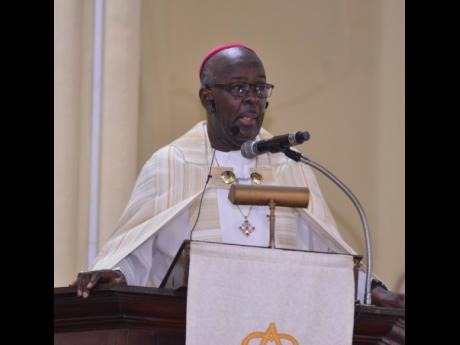Sean Major-Campbell | A voice for our time
USING 1 CORINTHIANS 12:12-14 as his text, newly enthroned Diocesan Bishop Leon Golding lamented the division in the Church. Division is, of course, one of the most off-putting truths about religion.
Bishop Leon Golding noted, “In every age, the Church has had to deal with internal conflicts. The human ego gets in the way of the mission of God, retarding the work, as we fight for the power and the glory.
Paul uses the human body as a metaphor for the Church. The human body has many parts and requires all its parts to work together for its proper and efficient functioning. Also, the Church, though it has many members, is called by God to be one, united, with all the members working together.”
The timely message comes when many are not clear on how exactly the Church should be involved in matters of governance and working collaboratively with state and wider civil society. An important observation is, “It is an error to think that the Church is called to be a holy club, withdrawn from what is happening in the world. Of course, there are those who would want the Church to remain behind closed doors in prayer, and only address the symptoms of evil, but not speak to the root causes that have implications for how people live. For the Church to do this would be for us to fail in our mandate from Christ, who, on Sabbath in the synagogue, declared his ministry as follows:
‘The Spirit of the Lord is upon me,
because He has anointed me
to bring good news to the poor.
He has sent me to proclaim release to the captives
and recovery of sight to the blind,
to let the oppressed go free,
to proclaim the year of the Lord’s favour.’ (Luke 4: 18-19)”
The call is not for the Church to take the reins of power from the political directorate. Instead, it is a recognition that Christians are key stakeholders in advancing the message and work of good governance and justice.
NOT THE ONLY VEHICLE
The simply presented message observes, “I suggest further that as denominations come together to forward the work of the Church, that we join with others for the good of our country and world. We must be prepared to sit down at the table with others, those different from us, to unite against the evils of our time for the good of all. We need to widen the circle for the good of all. The Church is not the only vehicle that God is working through to bring about His will.”
In a time when Christian extremism prevails, it is refreshing to hear the reminder, “I am prepared to collaborate with all people, Christians and non-Christians, people of faith and no faith, politicians, civic authorities, non-governmental organisations, for the good of our people. Because God loves and values every human being.”
We do well to hear again, “Going forward, we must recommit to unity as a diocese, we must collaborate with other Christian and faith traditions. We should work together with government, non-governmental organisations, and other agencies to pursue what we believe is God’s will for everyone. We do not help people through condemnation. Dialogue is more effective. It is in dialogue that the issues become clearer to us and there is a better understanding of people’s experiences and held views. We must be careful as a Church not to be too quick to condemn and demonstrate without having the facts and hearing the other’s story.”
One week after the seating of Bishop Golding, the world received news of the appointment of the new Archbishop of Canterbury, the Rt Revd Sarah Mullally. As expected, the news has been met with mixed responses.
The Independent out of Uganda reports, under the captioned ‘Church of Uganda slams appointment of woman Archbishop of Canterbury’: “ Our sadness about this appointment is her support and advocacy for unbiblical positions on sexuality and same-sex marriage that reveal her departure from the historic Anglican positions that uphold the authority of Scripture for faith and life,” wrote Rev Dr Stephen Samuel Kaziimba Mugalu, Archbishop of Church of Uganda.
ESSENCE OF HUMANITY
Meanwhile, Church of England cleric the Rev Jide Macaulay, observes in a Facebook post, “…This is not merely a debate about women in ministry; it is about the very essence of humanity. It is about the Church’s failure to embrace the full diversity of God’s creation — LGBTQ+ people, persons with disabilities, women seeking agency over their bodies, survivors of gender-based violence, and all who have been silenced or shamed in the name of religion.
The truth is simple: patriarchy is dead. It may still make noise as it falls, but its time has passed. The Church cannot thrive in peace, compassion, and justice while shackled by those who fear equality.
If some wish to walk away, so be it — let them. The future of the Church belongs to those who love without prejudice and lead with grace... .”
It is most fitting to reflect on Bishop Golding’s word, preached prior to the appointment of the new Archbishop of Canterbury: “Those who follow Christ must get involved in the business of the world. A world Christ came to save. The Church is called to embrace all people in the name of Christ for the good of our country and world.”
Fr Sean Major-Campbell is an Anglican priest and advocate for human rights and dignity. Please send feedback to columns@gleanerjm.com and seanmajorcampbell@yahoo.com.

